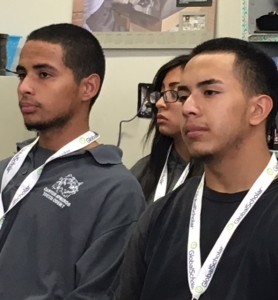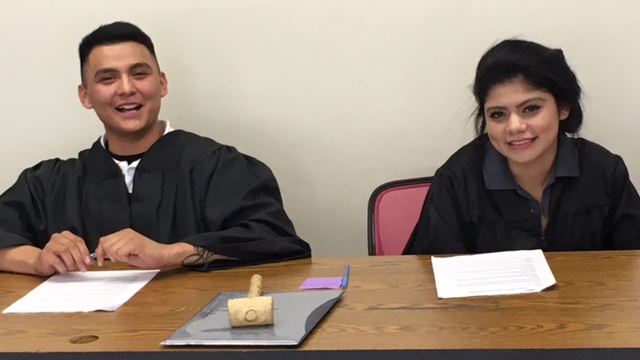The jury listens carefully as the defense attorney explains why his client is habitually late for class.
His father is serving a 15-year prison sentence and his mother is indefinitely hospitalized, so he stays with relatives and doesn’t have a reliable alarm clock.
His vice principal says the student’s grades and attendance are good, he just struggles to get to school on time.

The jury deliberates and decides suspension or detention won’t help the defendant improve in school. The jury unanimously agrees to require weekly peer counseling. One juror volunteers to meet weekly with the defendant to provide encouragement and support.
All the courtroom participants — judge, jury, attorney, bailiff and defendant — are students at Canyon Springs, a Caldwell alternate high school. They are members of the Canyon Springs Youth Court, a class launched last year to promote appropriate school behavior through peer review.
The class has been a huge success, said school leaders, because teens take responsibility for each other.
“We have a lot less problems in school because of youth court,” said teacher Heather Ramos.
Canyon Springs Youth Court meets daily, as students learn about court proceedings and the law. About once a week, the classroom transforms into a traditional trial environment, with courtroom proceedings that imitate real life. The jury listens, deliberates and hands out penalties.
“We’ve found these kids respond positively to peer review,” said Ramos, who teaches the Youth Court class and a juvenile law class, popular electives among the student body of 300.
Because of Ramos’ unique class offerings, students are not sent to the principal’s office when they misbehave, skip school or get caught smoking or stealing. They instead must answer to their peers, who decide punishments such as counseling, tutoring, community service, restitution or a letter of apology.
“Kids’ attitudes, grades and behavior here have gone through the roof,” Ramos said.
Salena McQuinn is an example of the court’s success. Last year she rarely attended school. She abused drugs and alcohol. Once caught, she was sent to the juvenile detention center as a teen criminal. Her time there was difficult, but also life-changing.
“I learned from my mistakes,” she said.
Today, the 16-year-old is clean and sober and serving as the judge for the Youth Court. She wants to go to college and study law.
“Our school court is a great opportunity and so much better than real court. I know, I’ve been there,” McQuinn said. “This place will help them.”
It’s helped McQuinn, who enjoys the youth court class so much she’s determined to perform well in her other classes. If students have habitual problems in other classes, they have to drop out of youth court.
McQuinn hasn’t missed a day of school this year and her grades are perfect so far.
“I feel I belong here. I don’t want to mess this up,” said McQuinn, who could be the first in her family to graduate from high school.
Freshman Greg Farrell feels the same way. He was a troublemaker in middle school, disrespecting students and teachers.
“I want to stay in the youth court class and that’s helped me not get in trouble anymore,” Farrell said. “This is a good way to help other kids.”
Real juvenile court was a wakeup call for Rico Rodriguez, another member of the youth court. “I’m done with that,” he said. “Our school court is awesome because it gives a kid a chance before real court.”
Rodriguez, like Farrell, is interested in criminal law and sees that interest as a path to college.
“Our youth court works for keeping kids out of trouble, because they don’t want to be judged by their peers, plus for those serving in youth court, they can relate to their classmates and they want to mentor them,” said principal Monica White. “It’s been a great success.”

